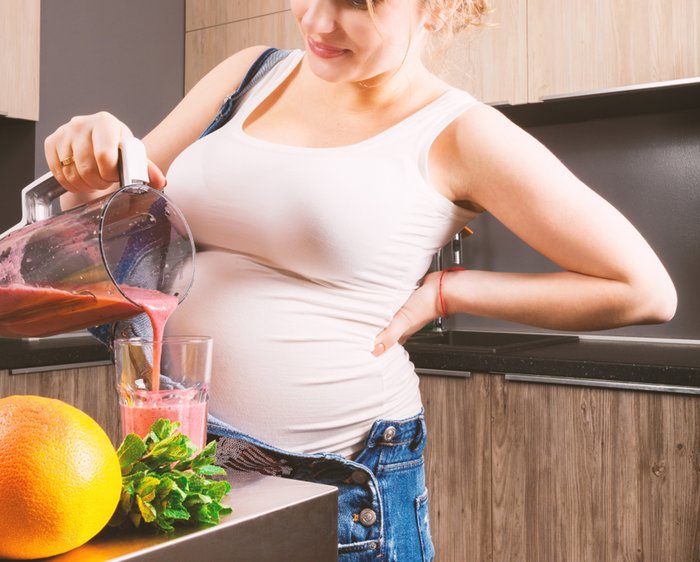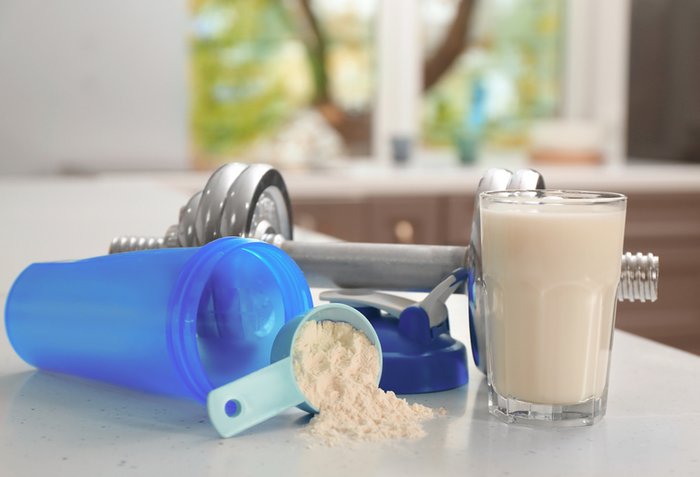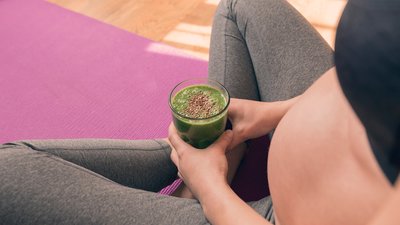Our bodies are built by proteins found in every area of the body, from the lining of cells to blood to muscle tissue. So, of course protein is a necessary component of a healthy pregnancy. But is protein powder safe during pregnancy?
The idea of using supplementation during pregnancy is nothing new. In fact, many women begin taking prenatal vitamins before they become pregnant, anticipating the increased demands growing a fetus will place on their body. So, in addition to adding protein-rich foods to their diet, many women view protein supplements as another way to enhance their pregnancy nutrition, ensuring they take in enough of the nutrients necessary for proper fetal growth.
While only a few studies cover this topic, we'll discuss what you need to know about protein requirements during pregnancy, as well as the safety of protein powder. That way you can make educated decisions about supplementation for you and your baby.
Nutritional Needs During Pregnancy
During pregnancy, the nutritional needs of both mom and baby increase rapidly along with maternal body mass. Specifically, protein needs increase in order to keep up with the body's hard work and metabolic demand as it creates new tissues.
Nutritional needs vary by individual. Typically, they are calculated by body mass, which changes rapidly during pregnancy. The current recommended daily allowance for pregnant mothers is 0.88-1.1 grams of protein per kilogram of body weight per day for all stages of pregnancy.[1]

Research on protein requirements at various stages of pregnancy is scarce. However, a study in The Journal of Nutrition suggests that the daily protein needs for pregnant women increase to 1.22 grams of protein per kilogram of body weight for early gestation and 1.52 grams by the third trimester.[2] Another study suggests the last trimester should include at least 30 additional grams of protein per day.[3]
It's important to note that this protein increase should be accompanied by an overall caloric increase to meet the growing demands of the fetus.
The best way for a pregnant woman to increase her protein consumption is through protein-rich whole foods, such as eggs, chicken, fish, and beans. Along with protein, these whole-food protein sources also include other nutrients that are important during pregnancy, including iron and vitamin B12.
Consuming additional protein can be tough, however, especially during the first and second trimester, when appetite may be dampened. During these first few months, the very thought of meat can make you queasy. In that case, finding a high-quality protein powder may be a great way to get the extra calories and nutrients you need in your diet to fuel those baby gains!
Are Protein Powders Safe?
Protein powders are considered safe for both pregnant and non-pregnant women. That said, it's always a good idea to run the idea of taking protein powder past your OBGYN or other health care provider first.
When choosing a protein powder, read the ingredients list carefully. Pick a protein supplement made with minimal ingredients that have all been verified by a third party. The first ingredient of any protein powder should always be the source (i.e. whey isolate, egg, or a plant-based blend), followed by a natural sweetener (i.e. cane sugar, stevia, etc.) and/or flavorings like vanilla, cacao, or chocolate.
Additional ingredients like lecithins or xantham gums, used to add texture, are generally safe. Be sure that the list of additives doesn't include saccharin, which hasn't been approved for pregnancy because it can cross the placental barrier; stimulants, such as caffeine; artificial sweeteners; or any additional chemicals or fillers.
If you aren't familiar with a certain ingredient on the label, choose a different brand or at least bring the label to your doctor. Decide together if it is a good choice for you.

If you want to add protein to your diet but don't love plain smoothies, check out some protein powder recipes to help satisfy your taste buds and give you a healthy, high-protein option for pregnancy cravings. Simply adding fruit or oats to your shake or smoothie bowl can make a world of difference in taste and texture!
Which Protein Powders Are Best to Use During Pregnancy?
The most-popular protein powder sources are safe to consume during pregnancy. These include whey protein, soy protein, casein protein, other animal-based proteins, egg protein, and plant-based proteins.
Protein powders are a supplement. They are not intended to replace the whole foods that help constitute a healthy diet. Even meal-replacement shakes shouldn't replace whole foods during pregnancy, even though they contain the recommended macronutrients, essential fatty acids, and other vitamins and minerals needed during pregnancy.
Instead, use the shakes as an additional meal or snack to help with the extra nutrient and caloric demand of a growing baby! Essential amino acids (EAA) and branched-chain amino acids (BCAA), the constituents of protein, are found both in powders and food stuffs in your regular diet. These components cross the placental barrier and are key regulators in growth and development.[4]
Although high-quality, additive- and chemical-free protein powders are safe, the research is unclear regarding BCAA and EAA supplementation during pregnancy. The lack of good data supporting supplementation means it's probably better to follow the general recommendations and get these constituents from food and/or whey protein for a comparable amino acid profile.
How Can Protein Benefit Pregnancy and Nursing?
It's no surprise that adequate protein intake is crucial for both the pregnant mother and baby throughout all stages of gestation—but it's especially important during the third trimester.[3,5]

Protein helps in building a strong placenta and other extra-embryotic membranes and tissues for the fetus. It also aids in changes to the heart, blood, breast tissue, and uterus happening in the mother.[5] Low protein intake throughout pregnancy is associated with low birth weight and heart-related issues later in life.[6]
This increased need for nutrients from quality food sources carries on after the baby is born and into lactation. A breastfeeding woman may need 30 percent more calories just to keep up with milk production. This increased caloric demand includes an increased need for protein.
Some research even suggests that higher protein diets increase not only lactation output but also the protein content of the milk.[7] So, as you increase the amount of quality protein you consume from good sources, you may increase the quality of the breast-milk protein you produce!
Overall, protein supplementation is safe for pregnant and lactating mothers alike. After tapping whole foods for most of your protein, strategically use powders to boost your intake for the day and avoid some of the common food aversions that often come with the early stages of pregnancy. Find a quality protein with minimal ingredients, and make sure to avoid any additives that could be harmful to you and your baby.
References
- Duggleby, S. L., & Jackson, A. A. (2002). Protein, amino acid and nitrogen metabolism during pregnancy: how might the mother meet the needs of her fetus? Current Opinion in Clinical Nutrition & Metabolic Care, 5(5), 503-509.
- Stephens, L. D., McNaughton, S. A., Crawford, D., & Ball, K. (2015). Nutrition promotion approaches preferred by Australian adolescents attending schools in disadvantaged neighbourhoods: a qualitative study. BMC Pediatrics, 15(1), 61.
- Elango, R., & Ball, R. O. (2016). Protein and Amino Acid Requirements during Pregnancy. Advances in Nutrition, 7(4), 839S-844S.
- Manta-Vogli, P. D., Schulpis, K. H., Dotsikas, Y., & Loukas, Y. L. (2018). The significant role of amino acids during pregnancy: nutritional support. The Journal of Maternal-Fetal & Neonatal Medicine, (just-accepted), 1-181.
- Stephens, T. V., Payne, M., Ball, R. O., Pencharz, P. B., & Elango, R. (2014). Protein Requirements of Healthy Pregnant Women during Early and Late Gestation Are Higher than Current Recommendations. The Journal of Nutrition, 145(1), 73-78.
- Blumfield, M. L., & Collins, C. E. (2014). High-protein diets during pregnancy: healthful or harmful for offspring?
- Forsum, E., & Lönnerdal, B. (1980). Effect of protein intake on protein and nitrogen composition of breast milk. The American Journal of Clinical Nutrition, 33(8), 1809-1813.

